Ocean Wise and Canadian Kelp Resources Get Kelp From a Stone
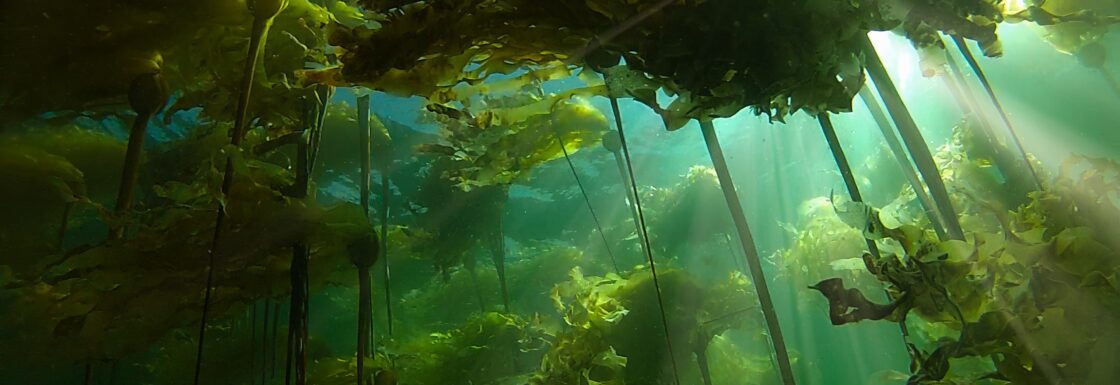
Projects Sponsor
After planting a transect in Vancouver Island’s Rainy Bay with small pebbles seeded with baby kelp fronds, they helped a giant kelp forest strip spring up in only eight months.
Largely due to climate change, kelp forests are in severe decline, with an estimated loss of 40 – 60% globally. This decline threatens important marine biodiversity as well as a long-standing carbon sink. Global conservation organisation Ocean Wise estimates that in British Columbia alone, kelp forests store at least 7,755 tonnes of CO2 per year. That’s equivalent to the emissions of heating 3,900 B.C. homes using natural gas.
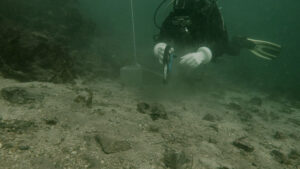
Kelp is a help and in 2019, recognizing that underwater kelp forests represent an extraordinary opportunity for nature-based climate solutions, Ocean Wise began exploring opportunities to support the restoration, protection, and cultivation of this handiest of stramenopiles.
The Ocean Wise team wanted to develop cost-effective kelp restoration methods that can be applied at scale across the world, and they looked to the stones for an answer.
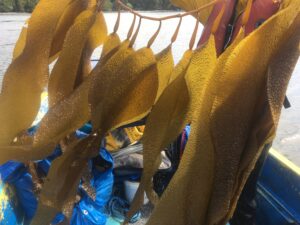
Green Gravel technology — the seeding of kelp babies onto small rocks that are easily spread on the ocean floor — is an emerging technique for kelp forest restoration. While promising, not enough was understood about the best practices for restoring species such as giant kelp and bull kelp — species most threatened by warming oceans on the Pacific coast.
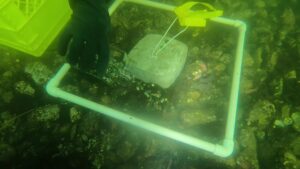
Recognizing the knowledge gap, Ocean Wise dove right in.
In late 2021, Ocean Wise initiated their first in-water project for kelp forest restoration in Rainy Bay (Nuu-chah-nulth territory, Barkley Sound, Vancouver Island). In collaboration with their partners, Canadian Kelp Resources and Rendezvous Dive Adventures, they used green gravel technology to seed a 200m2 transect with three local kelp species (bull kelp, sugar kelp, and giant kelp).
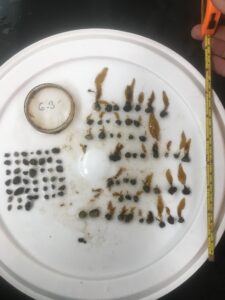
Divers from Rendezvous Dive Adventures identified suitable sites to conduct green gravel trails, selecting two transects close to Rainy Bay, British Columbia. These transects, each 100m long and 1m across, spanned multiple substrates, from large boulders to small pebbles and sandy bottomed areas. They were selected considering depth, freshwater outflow, local knowledge of the area, and convenience for monitoring. Kelp was by-and-large absent in both transects at the onset of the experiment. Green gravel was deployed between late November and early December 2021 and expectations were modest, in September 2022, their dive team visited the green gravel transects to assess the growth that took place over the summer.
From a previous visit in early spring, the dive team expected the results to be mixed, but at the Macrocystis (giant kelp) transect, they found a large kelp forest had sprung up and flourished over the summer, directly between the 25m and 75m stretch of their transect.
Divers also noticed a high density of life, from large schools of perch to a couple of juvenile sunflower stars – a species that was decimated by the Sea Star Wasting disease a few years before.
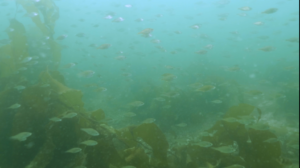
To better measure the impacts of kelp restoration on local biodiversity, the team also launched an innovative survey at the Rainy Bay site using environmental DNA to establish the baseline of biodiversity before the expected growth of kelp on the transects. This DNA sampling technique offers a “snapshot” of the presence or absence of certain species by collecting genetic material (fish bits, traces of skin, scutes, etc.) floating around in the water. This DNA is then enhanced, analysed, and compared against a database of local species to determine what was present in the water around the time of collection.
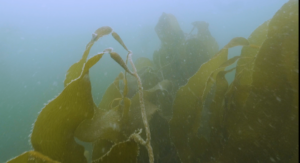
The team’s first round of eDNA analysis successfully identified many of the species observed by divers in addition to others, including the Pacific Herring.
Overall, the success from Ocean Wise’s first year of green gravel trials is exciting. Their work demonstrated that green gravel can be used to propagate giant kelp in B.C. waters and the team will continue to monitor the site to understand the dynamics of their newly restored kelp bed.
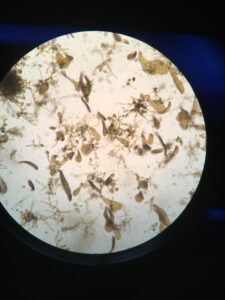
The lessons learned will advance global efforts to restore this critical ocean habitat. Results from the Rainy Bay pilot will help the team launch larger scale projects in B.C. and contribute to best practices that can maximise restoration and carbon sequestration potential of kelp on a wider scale.
Ocean Wise is set to take green gravel tech to new depths to bring essential kelp to new heights.













